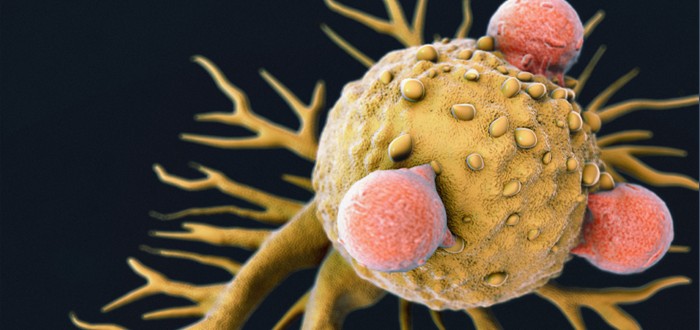One of the challenges scientists face when trying to develop an effective gene therapy for mesothelioma is figuring out how to get lab-modified immune system cells to the site of the mesothelioma tumor.
It’s not enough to simply inject or infuse you with the good guy cells. The therapeutic agent also has to be able to locate the mesothelioma tumor and travel to it through your bloodstream.
Researchers from the Perelman School of Medicine at the University of Pennsylvania have been working on this problem for a while. They gave a presentation at the American Association for Cancer Research (AACR) annual meeting held in Philadelphia to describe the progress they’ve made.
Mesothelioma in the Crosshairs
For some time now, the Perelman team has been experimenting with the use of chimeric antigen receptor T cells — also known as called CAR T cells.
CAR T cells are immune system cells that normally attack invaders of the body, such as germs and viruses, but not cancer cells. This is because of the tricks cancer cells play to hide from CAR T cells.
It just so happens that certain cancer cells — mesothelioma among them — express a protein called mesothelin. The Perelman researchers have taken normal CAR T cells and modified them so that they are irresistibly attracted to mesothelin.
So if a cell has mesothelin on its surface, these CAR T cells will come looking to find it. When they do, they will attach themselves to it and start the process of destroying it.
At the AACR meeting, the researchers offered a peek at the not-yet-finalized findings of a CAR T cell Phase I clinical trial they been conducting.
The researchers reported that their CAR T cells exhibit impressive endurance, remaining active and effective in the bloodstream for nearly a full month before self-mothballing.
A problem the researchers have been working to overcome deals with the tendency of their modified CAR T cells to attach to mesothelin-expressing cells other than those that are cancerous.
It so happens that some healthy cells also express mesothelin. Apparently, the researchers have been able to tweak the CAR T cells in such a way that “friendly fire” incidents are less likely to occur.
Clinical Research Focuses on CAR T Cells
In their earlier work with CAR T cells, the researchers made their observations with the help of just two patients. This time, they are studying CAR T cells in a total of five.
Two of this group’s patients have epithelial mesothelioma. Another two have ovarian cancer. The fifth patient has pancreatic cancer. All were in part chosen to participate because their cancer was non-responsive to standard medical interventions.
The CAR T cells used in this investigation were harvested from each patient’s body using a process known as apheresis and then modified in the lab by adding a single molecule.
After the clinical trial ends, probably later this year, the researchers say they plan to continue monitoring the participants for the next 15-20 years.
They want to do that in order to develop the fullest picture of CAR T cell persistence. They said they also want to see how long the engineered cells’ antitumor activity lasts.
At the AACR meeting, the researchers said they believe the study is contributing much to “a growing body of research showing the promise of CAR T cell technology.”


